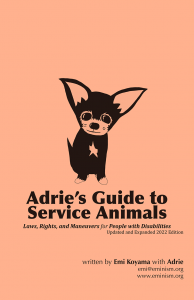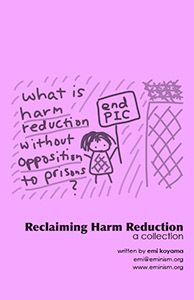The original letter
October 29, 2016
Expedia Inc.
333 108th Ave NE
Bellevue, WA 98004
accessibility@expedia.com
Ganesh Hotels
3252 Cassopolis St.
Elkhart, IN 46514
info@ganeshhotels.com
Wyndham Hotel Group
22 Sylvan Way
Parsippany, NJ 07054
wyndhamcc@wyn.com
Dear Customer Service Representatives
My name is Emi Koyama and I am writing to make a formal complaint about the experience I had at Super 8 Hotel in South Bend, Indiana operated by Ganesh Hotels on October 27, 2016. The room was booked on September 24th through Expedia.com. I was visiting South Bend to give the 2016 Gloria Kaufman Memorial Lecture at Indiana University South Bend.
I understand that some people (I’m not sure who they are) who read about the incident on social media have contacted some of you, but I thought I’d provide my own account directly.
At around 6pm, I was dropped off at the hotel by the ADA paratransit service (Transpo Access). I went in and asked to check in, but I was told that there would be a special fee for my dog. I explained to the clerk at the front desk that the dog was a service animal, to which she demanded to see a document identifying the dog as a service animal. I explained to her that there is no such thing, and the documents that some travelers may present carry no legal weight.
Still, she insisted on seeing the document. As I was prepared for this, I pulled up a Department of Justice guideline on ADA service animals on my iPad, which read, in part:
When it is not obvious what service an animal provides, only limited inquiries are allowed. Staff may ask two questions: (1) is the dog a service animal required because of a disability, and (2) what work or task has the dog been trained to perform. Staff cannot ask about the person’s disability, require medical documentation, require a special identification card or training documentation for the dog, or ask that the dog demonstrate its ability to perform the work or task.
I have encountered resistance from restaurant and hotel employees who were not trained about these legal requirements, but usually showing this document resolved the problem. This time however, the front desk clerk suggested that the federal regulation I pulled up may be “fake” because I just got it off the internet, and continued to demand a documentation. I asked her to use her own computer or phone to look up the document from the Department of Justice website to make sure that it is legit, but she refused to do so.
The clerk then called her manager, and, after explaining the situation to the manager, handed the phone over to me. I explained the federal regulation on service animal and read the paragraph I quoted above to the manager, but she also insisted that the documentation was required, because I could be lying about the service animal or the federal regulation. Again, I asked her to go to the Department of Justice website herself to find out if I was “faking” the law, but she declined. I asked the manager for her name, to which she replied “Sara” but refused to provide her last name. I gave the phone back to the clerk at her request, by which point the manager apparently made the decision to refuse service to me.
After hanging up the phone with the manager, the clerk told me that the hotel has decided to refuse service, which is clearly an abuse of discretion a business has and a violation of federal civil rights law (and probably Indiana’s as well—though I have not done any research about the relevant state law). I asked the clerk if I could stay in the lobby while I ask the people from the Indiana University who invited me to South Bend could come meet me and help me figure out what to do, but she insisted that I had to leave the building immediately or she would call the police on me.
Thus, I found myself and my dog freezing outside in a cold rainy weather of about 40 degrees temperature with strong wind blowing at around 6:30pm. Because I was dropped off by the ADA paratransit, which requires a reservation at least a day prior to the date of travel, I had no transportation. Further, I use electronic wheelchair which does not fit in most cars or cabs, so I had no place to go or means to get there.
I was desperate for help from someone in the area who could take me to a different place or at least come and let me get in their car so my dog and I could be warm at least, so I posted an urgent request for help on social media. I did not ask anyone to complain to the hotel, but apparently some people did, and the clerk came out at around 7:25pm after almost an hour of freezing outside in cold rain, and told me that she was letting me check in. At that point finally I was told that the hotel would accept my dog as a service animal. (I posted an update to the original social media call for help letting everyone know what happened after entering my room.)
What happened to me that evening is not just a violation of the federal Americans with Disabilities Act, but also a failure of basic human decency. The clerk was clearly not trained on the legal obligation under the Americans with Disabilities Act, and the manager was also ignorant about it, but they also lacked imagination about what it would mean to throw out a customer with a disability using a wheelchair who have traveled from afar in a remote area where there are no other businesses or public transit or anything nearby on a cold rainy night.
Ganesh Hotels: How do you train employees or hotel managers on legal obligations under the Americans with Disabilities Act? How did this failure occur, and what are you doing to ensure that it will not happen to other people? Remember, I happened to have the knowledge of the ADA guideline and social connections that allowed me to get inside eventually, but other customers might not and they still do not deserve to be left freeing outside.
Wyndham Hotel Group: What protections are in place for franchisees bearing your brands (Super 8, etc.) are in compliance with the Americans with Disabilities Act? How was it possible for the entire staff at a Super 8 hotel to be ignorant about their legal obligations, and what are you doing to ensure that the same thing will not happen at other Wyndham-branded hotels?
Expedia Inc.: What do you do as a market facilitator to ensure that companies that you partner with are in compliance with the Americans with Disabilities Act and that it is safe for people with disabilities to book their travels with Expedia and your other sites?
I would like to hear your responses to these questions and also receive a formal apology from the manager of Super 8 Hotel in South Bend or someone above her. My friends have suggested that I should sue the hotel or demand a full refund. I would not go that far at this point because I was otherwise satisfied with the room and the booking process, but I think it would be fair and reasonable to ask for a refund for at least one night’s stay after I was left freezing outside for almost an hour in a strange city, wondering where I would go and how.
What I want out of this incident most is the assurance that the practice of disability discrimination is discontinued at Super 8 Hotel South Bend as well as at any other hotel under the control of Ganesh Hotels or in partnership with Wyndham Hotel Group or Expedia, Inc.
Thank you very much for your immediate attention to this problem. I look forward to hearing from you in the next couple of weeks.
Best,
Emi Koyama
Response from Wyndham Hotel Group:
Case # 3749437
Site # 14645
Dear Emi Koyama,
Super 8 Worldwide is in receipt of your concerns regarding your stay at SOUTH BEND , IN on or about 10/27/2016. We sincerely apologize for any inconvenience this has caused you.
Super 8 Worldwide appreciates you bringing your concerns to our attention. We take these matters very seriously. While Super 8 Worldwide is solely the franchisor of the Super 8 Worldwide trade name, trademarks, and service marks to independently owned and operated Super 8 Worldwide guest lodging facilities, we require all Super 8 Worldwide facilities to comply with applicable law, including the Americans with Disabilities Act and its directives. We have contacted the owner/operator of this facility regarding this incident and conveyed our expectation that he/ she take steps to address it adequately. As this matter is the responsibility of the owner/operator of the facility, the facility is in the best position to respond. Please direct further communications to:
Priti Jairam
4124 Ameritech Drive
South Bend, IN, 46628-9126
(574) 243-0200
Customer Care
Wyndham Hotel Group
Tele: 888-675-3379
Fax: 888-565-7707
Response from Super 8 Hotel South Bend:
November 1, 2016
Dear Ms. Koyama,
I, Priti Jairam, general manager at Super 8 South Bend, am writing this email to you on behalf of my employee to apologize. I deeply regret what happened on October 27th 2016 and hope that you accept my apology.
We do not handle situation like this lightly therefore, we would like to give you full refund of your stay with us. We would also like an opportunity to accommodate you in future as well.
Thank you for bringing this to my attention, if there is anything else I can further assist you with, please let me know.
Sincerely,
Priti Jairam
Super 8- South Bend
4124 Ameritech Dr
South Bend,IN 46628


